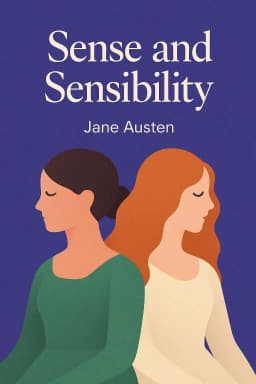
The Original Disruptor: Jane Eyre's Playbook for Challenging Corrupt Systems
Golden Hook & Introduction
SECTION
George Li: Wow, Celeste. That’s a nightmare scenario. Professionally, your career is on life support. The reputational damage is catastrophic. Your first thought is probably survival, but it's hard to see a path forward when the person at the very top is the source of the attack.
George Li: I love that framing. It’s about extracting the strategy from the story. People like Steve Jobs, whom I admire, were famous for creating a 'reality distortion field' to push their vision. Jane has to create her own, just to survive a hostile reality.
Deep Dive into Core Topic 1: Systemic Hypocrisy: Analyzing Mr. Brocklehurst's Flawed Enterprise
SECTION
George Li: The CEO, for all intents and purposes. His vision dictates the organization's culture and its metrics for success.
George Li: Okay, I have a feeling this isn't going to end well for Julia.
George Li: He’s enforcing a strict, uniform 'brand' for his students, and anything that deviates, even naturally, is seen as a defect that must be eliminated. It's about absolute control, not education.
George Li: Oh, that's the smoking gun, isn't it? The hypocrisy is laid bare. It’s a catastrophic failure of leadership. He's essentially telling his 'employees' to live by a set of austere values that he and his own 'board members'—his family—flagrantly ignore. The cultural damage from that one moment is immense. It completely undermines his authority and invalidates his entire mission.
George Li: His metrics are all wrong! He's optimizing for suffering, believing it leads to spiritual 'profit.' His Key Performance Indicators, or KPIs, are things like hunger, cold, and humility. But the actual data, which Brontë gives us later, is the typhus outbreak that devastates the school. That's the real outcome of his system. It's not only inefficient; it's dangerously destructive. He's running the organization into the ground by focusing on the wrong results. It's a classic case of a leader being blinded by ideology, ignoring the real-world data that shows the system is failing.
Deep Dive into Core Topic 2: Reputation Under Fire: Jane's Battle for Her Personal Brand
SECTION
George Li: So a negative report has already been filed by a hostile party. The deck is stacked against her from day one.
George Li: The worst possible thing that could have happened. All eyes on her.
George Li: That moment with the slate... it's a crisis point. Her 'stock price' just plummeted to zero based on false information from a hostile source, Mrs. Reed. And Brocklehurst, the 'CEO,' amplifies it without any due diligence. It's a reputational nightmare. As an analyst, you see this and think, there's no coming back from that.
George Li: That's so powerful. In my world, that's a key stakeholder showing support when everyone else is selling off their stock. It's a small act, but it signals that the narrative isn't monolithic. It’s a vote of confidence. It tells Jane, "I don't believe the official story." It gives her the strength to endure the 'market panic.'
George Li: Right, a smile won't fix her reputation. She needs a formal correction of the record.
George Li: She's doing the due diligence that Brocklehurst failed to do. She's fact-checking.
George Li: And that's how you do it. That is a masterclass in reputation recovery. It's about the power of data and third-party validation. Miss Temple doesn't just offer sympathy; she seeks out corroborating evidence. She verifies Jane's story, and then she doesn't just whisper it—she makes a public announcement. She restores Jane's 'brand' in the 'marketplace' of the school. That's how you fight a smear campaign: with facts and a powerful, credible advocate.
Synthesis & Takeaways
SECTION
George Li: It's a story about the personal courage to defy a broken system, but also the strategic necessity of finding allies and using truth as your ultimate weapon. Jane's emotional outburst against Mrs. Reed earlier in the book was pure, raw defiance. But her recovery at Lowood was strategic. It required patience, an advocate, and verifiable facts.
George Li: That's the question, isn't it? And I think Jane's story shows that while defiance is powerful, strategic action is what ultimately wins the war. You need both the fire to stand up for yourself and the wisdom to know how to make your case effectively. A powerful lesson from a 175-year-old book.
George Li: My pleasure, Celeste. It was fascinating.









